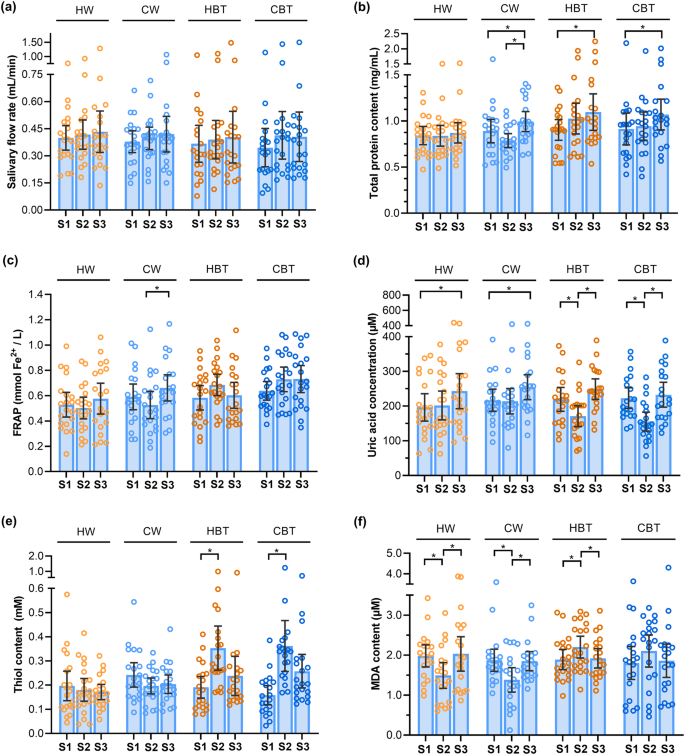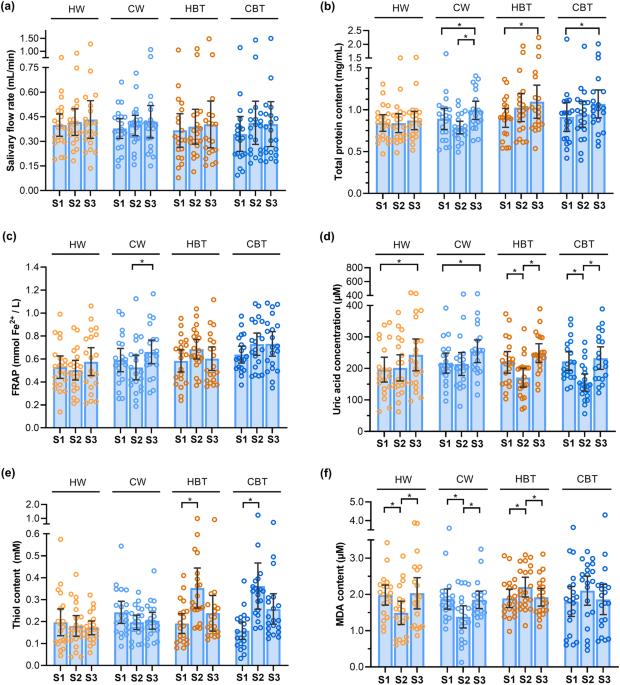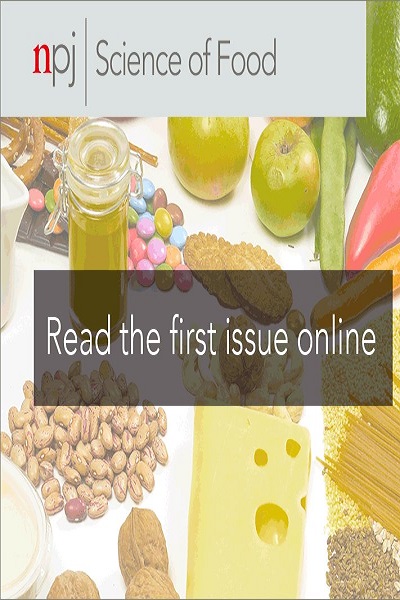喝茶和喝水对人体唾液氧化还原作用的短期区别
IF 7.8
1区 农林科学
Q1 FOOD SCIENCE & TECHNOLOGY
引用次数: 0
摘要
进食会改变人体唾液的生物化学和氧化还原状态,食物的食用温度也可能起到一定作用。本研究旨在探讨摄入热茶(57 ± 0.5 °C)和冷茶(8 ± 0.5 °C)对唾液流速和唾液氧化还原相关属性的即时(3 分钟)和延迟(30 分钟)影响。研究收集了 20 名健康成年人在饮茶前、饮茶后 3 分钟和饮茶后 30 分钟的唾液。以相同温度的热去离子水或冷去离子水作为对照。分析并比较了热茶组(HBT)、冷茶组(CBT)、热水组(HW)和冷水组(CW)的唾液流速和氧化还原标志物。结果表明,红茶和水都不会改变唾液流速;红茶会立即增加唾液中硫醇(SH)和丙二醛(MDA)的含量,同时显著降低唾液中尿酸(UA)的含量。摄入茶叶后,唾液中的铁还原抗氧化能力(FRAP)有上升趋势,但并不明显。摄入水能立即降低 MDA 含量,并显著增加尿酸水平。与热水相比,冷水诱导唾液总蛋白(TPC)延迟增加的程度更大。总之,摄入红茶会对人体唾液的氧化还原属性产生急性和显著的影响,而饮料的温度则起次要作用。本文章由计算机程序翻译,如有差异,请以英文原文为准。


Distinguishable short-term effects of tea and water drinking on human saliva redox
Food consumption can alter the biochemistry and redox status of human saliva, and the serving temperature of food may also play a role. The study aimed to explore the immediate (3 min) and delayed (30 min) effects of hot tea (57 ± 0.5 °C) ingestion and cold tea (8 ± 0.5 °C) ingestion on the salivary flow rate and salivary redox-relevant attributes. The saliva was collected from 20 healthy adults before, 3-min after and 30-min after the tea ingestion. The hot or cold deionised water at the same temperatures were used as control. The salivary flow rate and redox markers in hot tea (HBT), cold tea (CBT), hot water (HW) and cold water (CW) group were analysed and compared. The results demonstrated that neither the black tea nor the water altered the salivary flow rate; the black tea immediately increased the salivary thiol (SH) and malondialdehyde (MDA) content while reduced salivary uric acid (UA) significantly. The tea ingestion showed a tendency to elevate the ferric reducing antioxidant power (FRAP) in saliva, although not significantly. The water ingestion decreased the MDA content immediately and increased the UA level significantly. Cold water was found to induce a greater delayed increase in total salivary total protein (TPC) than the hot water. In conclusion, the black tea ingestion affects the redox attributes of human saliva acutely and significantly, while the temperature of drink makes the secondary contribution.
求助全文
通过发布文献求助,成功后即可免费获取论文全文。
去求助
来源期刊

NPJ Science of Food
FOOD SCIENCE & TECHNOLOGY-
CiteScore
7.50
自引率
1.60%
发文量
53
期刊介绍:
npj Science of Food is an online-only and open access journal publishes high-quality, high-impact papers related to food safety, security, integrated production, processing and packaging, the changes and interactions of food components, and the influence on health and wellness properties of food. The journal will support fundamental studies that advance the science of food beyond the classic focus on processing, thereby addressing basic inquiries around food from the public and industry. It will also support research that might result in innovation of technologies and products that are public-friendly while promoting the United Nations sustainable development goals.
 求助内容:
求助内容: 应助结果提醒方式:
应助结果提醒方式:


